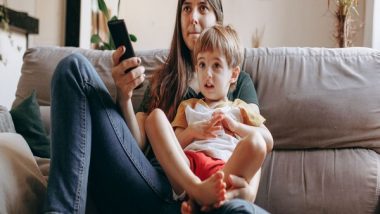Washington [US], September 22 (ANI): A recent study published in Frontiers in Psychology investigated the influence of passive screen use on a young child's cognitive development. It discovered that screen exposure - whether from a TV or a mobile device - might be beneficial depending on the context in which it's viewed.
Researchers from the University of Portsmouth and Paris Nanterre University, France, analysed 478 studies published in the past two decades. Their findings found exposure to television early on may be detrimental to play, language development and executive functioning, particularly for young infants.
Dr Eszter Somogyi from the Department of Psychology at the University of Portsmouth said: "We're used to hearing that screen exposure is bad for a child and can do serious damage to their development if it's not limited to say less than an hour a day. While it can be harmful, our study suggests the focus should be on the quality or context of what a child is watching, not the quantity.
"Weak narrative, fast pace editing, and complex stimuli can make it difficult for a child to extract or generalise information. But when screen content is appropriate for a child's age, it's likely to have a positive effect, particularly when it's designed to encourage interaction."
Studies also show screen time is more beneficial to a child if a parent or adult is present, as they can engage with them and ask questions.
"Families differ a lot in their attitudes toward and the use of media", explained Dr Somogyi.
"These differences in the viewing context play an important role in determining the strength and nature of TV's impact on children's cognitive development. Watching television with your child and elaborating and commenting on what is viewed can help enhance their understanding of the content, reinforcing their learning during educational programs.
"Coviewing can also contribute to the development of their conversation skills and provides children with a role model for appropriate television viewing behaviour."
While the right type of content can do more good than harm, the study warns watching TV shouldn't replace other learning activities, such as socialising. Instead, it is imperative to inform caregivers of children younger than 3 about the risks associated with prolonged exposure to screen viewing in the wrong context.
The authors recommend reinforcing contexts that promote learning, such as viewing chosen age-adapted content, viewing with adult supervision, and not having a second device or TV screen on in the background.
Dr Bahia Guellai, from the Department of Psychology at Paris Nanterre University, added: "The important 'take home message' here is that caregivers should keep in mind new technologies. Television or smartphones should be used as potential tools to compliment some social interactions with their young children but not to replace it.
"I think the most important challenge of our societies for future generations is to make adults and young people aware of the risk of an unconsidered or inappropriate use of screen-use. This will help in preventing situations in which screens are used as the new type of child-minding, as it has been during the pandemic lockdowns in different countries.
"I am optimistic with the concept of finding an equilibrium between the rapid spread of new technological tools and the preservation of the beautiful nature of human relationships." (ANI)
(This is an unedited and auto-generated story from Syndicated News feed, LatestLY Staff may not have modified or edited the content body)













 Quickly
Quickly

















